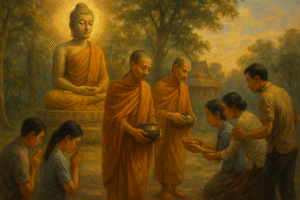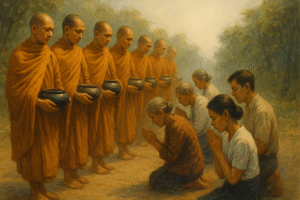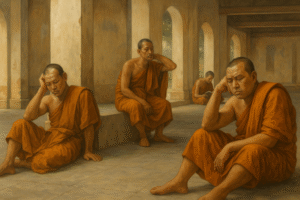Today, I’d like to share a few thoughts with you about something that we all experience from time to time, but often find difficult to discuss. I’m speaking about the grudges we bear, the hatreds we harbor, and the revengeful thoughts that occasionally cross our minds. Yes, I know, it sounds intense. But I assure you, there’s nothing inherently wrong with these sentiments. They are, after all, natural human instincts that arise in response to perceived slights or wrongdoings by others.
When I say there is no wrong in being hateful, I don’t mean to encourage it; rather, I wish to underscore that these feelings don’t originate purely from you. They are, in many ways, conditioned responses. We are the products of our environment, shaped by various influential figures in our lives.
Now, let’s dig a little deeper. Most of the time, hatred or a grudge flares up when someone fails to meet our expectations or ideals. They might have wronged us in some way or perhaps their actions simply didn’t align with our worldview. In these instances, they become an opponent in our eyes, and the seeds of resentment are sown.
Yet, if we take a moment to reflect, it becomes clear that these ideals, these expectations, were conditioned into us. Think back to your childhood. Maybe there was a time when you faced punishment for failing to meet someone’s expectations. That disappointment, that feeling of being ‘wrong’, might have fostered an instinctual response of hatred, now ingrained within you.
I’m not here today to preach about forgiveness or force you to absolve those who’ve wronged you. Instead, I want to encourage you to understand the root of these feelings. Greater awareness of where these thoughts originate is more beneficial than any lesson on forgiveness.
Our grudges, our hatred, and our revengeful thoughts often stem from our ego and misery. But let’s be clear, this isn’t entirely your fault. Our ego, with all its complexities, is shaped by layers of conditioning. It’s like a program installed into us by authoritative figures in our lives – our parents, teachers, religion, and society at large. These entities instill ideals within us, teaching us that deviation is wrong. This in turn creates divisions, fostering an environment ripe for hatred.
Regrettably, we’re not often taught how to love, or at least, we’re not instructed in the right way. Our concept of love is often distorted, tangled up in a web of societal expectations and personal insecurities.
I invite you to consider this: your perceived enemies, the ones who’ve caused you grief, are long gone. They hold no power over you, no ability to harm you further. Yet, by holding onto grudges, you keep them imprisoned within you, driven by fear and sustained by resentment.
Let’s consider respect. From an early age, we are taught to show respect to our elders. Failing to greet an elder properly was seen as disrespectful, even rude. This conditioning becomes so ingrained that, as we grow older, if a younger person fails to greet us appropriately, we might label them disrespectful, fostering a fresh seed of resentment. Do you see the cycle?
Our ego, that powerful state of self-consciousness, is often the catalyst for these reactions. It fuels our perception of slights and offenses. It’s not so much about forgiveness, but understanding the absurdity and futility of our hatred and revengeful thoughts. Recognizing the conditioning and inherent bias in our reactions allows us to question the validity of our resentment.
At its core, the lesson here is about understanding, not forgiveness. It’s about recognizing the factors that shape our reactions and emotions. It’s about
peeling back the layers of our conditioned responses and looking at them with a critical eye. It’s about identifying the root causes of our feelings of hatred, not to justify or validate them, but to comprehend their origins.
Now, let’s bring our attention back to the ego, that formidable force that often governs our perceptions and reactions. The ego is, in essence, a tool for survival. It makes us vigilant, helps us navigate societal norms, and often encourages us to protect our self-image at all costs. But, it’s essential to recognize that the ego is not an infallible guide. It can often lead us astray, taking us down paths of resentment and revenge, paths that can be destructive, even self-defeating.
For instance, let’s consider the scenario of the junior not greeting us respectfully. The ego, always ready to protect our self-image, could swiftly perceive this as an insult or a direct affront. This perceived slight can ignite feelings of resentment and fan the flames of anger within us.
However, if we were to momentarily distance ourselves from the ego’s immediate reaction and look at the situation through a more objective lens, we might realize that the younger person’s lack of proper greeting isn’t necessarily an indictment of our worth or status. Instead, it could very well be a reflection of their own personal circumstances, or their understanding of respect. This objective insight allows us to react with more understanding and less personal affront.
So, this lesson is not about forcing forgiveness, but about encouraging understanding. It’s about fostering awareness of the ego’s role in our reactions, and promoting a more thoughtful, measured response. It’s about realizing that our enemies only have the power we give them, that our grudges only serve to imprison us, not them.
And what about love? Well, love, in its purest form, is often overshadowed by societal expectations and misunderstandings. Love isn’t about possession or domination; it’s about understanding, compassion, and acceptance. Unfortunately, many of us are not taught this version of love. Instead, we learn a distorted version, one that is conditional and often full of unrealistic expectations. This distorted version can easily breed resentment and animosity when those conditions are not met.
So, as we navigate this complicated world, I urge you to recognize the conditioning that shapes our perceptions and responses. Understand that our grudges, our hatreds, and our revengeful thoughts are often a byproduct of this conditioning, influenced by the ego and our misunderstandings of love. The first step towards changing these conditioned responses is awareness. Once we are aware, we can begin to question, to challenge, and ultimately, to change.
In the end, it’s not about forgetting or forgiving. It’s about understanding, about recognizing the root causes of our emotions and reactions. And perhaps, in this understanding, we might find the freedom to let go, to release the grudges that imprison us, to dispel the hatreds that cloud our vision, and to quiet the revengeful thoughts that disrupt our peace.





